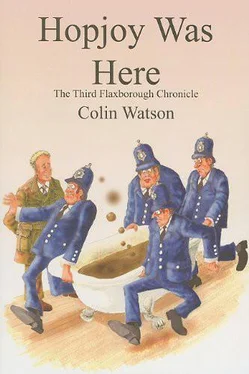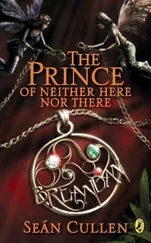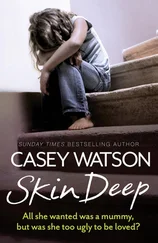“There are two women there; which one are you talking about?”
“The daughter. There wasn’t a squeak out of Ma. She just hovered.”
“You asked about the row in the bathroom?”
“Yes. She said she didn’t hear shouting or anything like that although she’d been watching the window while the light was on.”
“But if she was awake, surely she must have heard something. There’s not thirty yards between those houses. And even Periam admitted Hopjoy was yelling his head off. He of all people had nothing to gain by making that up: very much the reverse. Anyway, if there was no disturbance why the devil should she have taken it into her head to send off this letter she talks about?”
Love remained silent for a few seconds. Then, as if trying to compensate for some lapse of his own, he said: “Mind you, she did say she thought she heard a noise like breaking glass later on when she’d gone to bed. That could have been the acid thing, couldn’t it? And she said she got up again and saw somebody moving about in the garden.”
“I rather think,” Purbright said, “that I should have a word with Miss Cork myself. In the meantime, Sid...”—he drew from his pocket an envelope—“I wonder if you’d mind hawking this lighter around Hopjoy’s acquaintances to see if they can identify it.”
Contrary to Purbright’s expectations, the Corks received him with something approaching affability. The daughter led him to a parlour with the temperature of an orchid house—a small but fierce fire burned in the scrupulously tidy grate—and went off to make tea. Mrs Cork greeted him with a slow inclination of the head. She sat in a tapestried chair in the window bay. While her daughter was out of the room, she said nothing but stared at him approvingly, nodding from time to time as if she were half afraid that he might, if not thus encouraged, take himself off before the kettle boiled.
Purbright looked about him at a room that he supposed its owners would describe as a treasure chest of memories. Scarcely a single feature of its clustered contents had the look of ever being put to use. Books in a glass-fronted cabinet had been pushed into obscurity to make shelf room for ornate china cruets, an old calendar, dusty oddments of barbola work, and a collection of cards from bygone Christmases. Vases, of which there was a great number, were dry and flowerless, although a spray of paper roses emerged lopsidedly from a biscuit barrel. Within a set of three square decanters were the pale ochre stains of ancient sediment. An alabaster ashtray, bearing a card suit indicator, was lodged with a box of counters, a china boot and a manicure set, inside a cut glass salad bowl.
Pictures blockaded the room. Their flagships, so to speak, were a heavily framed lithograph depicting a horse thrusting its head through an open cottage window during the family meal (‘An Unbidden Guest’) and an enormous tinted engraving of Windsor Castle with besashed and garlanded picnickers in the foreground. A dozen or so photographs, standing on pieces of furniture or suspended on long cords from the picture rail, projected the sad, sepia stares of dead relations, trussed for their appointments with posterity by studio palm or rustic bridge.
The room smelled of linoleum and passed-down sewing boxes. There hung also upon the over-heated air the faintly mothballish odour of female old age.
Miriam Cork prepared the three cups of tea with finicky expertise on a tray balanced on her lap. Pouring tea, the inspector noticed, was an occupation that gave this stringy, straight-backed woman a kind of fulfilment. Her thin mouth was set in concentration. The big nose with a wart on its side seemed to stretch forth in anxious assessment of the strength and fragrance of the brew. Her eyes, pale and uncalm with hypochondria, steadied to measure the mounting amber line; there even shone in them a little pride.
Purbright began his questions. They invoked the sort of loquacity of which only that woman is capable who receives confidences from God in proportion to her readiness to interest herself in the frailties of mankind.
Oh, yes, she had known the Periam family ever since Gordon was a little mite. He had been a blessing to his mother, poor soul, whom God in His wisdom had sent widowhood through the agency of a brewer’s van with a loose wheel. Right through the years he had maintained his devotion to her—in spite of everything a certain brazen Miss Come-and-get-me had been able to do to take him away and have him marry her.
“He had a girlfriend in those days, had he?” Purbright found the notion intriguing.
“If that’s what you can call her. She was hanging round him ever since he was at school. But he didn’t let his mother be worried. That girl never stepped over the doorstep until after Mrs Periam was in her coffin. Of course, I knew when the end was coming, and it wasn’t just because I’d heard about the operation. It was a terrible operation, mind; they took all her insides away. No, the day before she passed on I saw my man in the black overcoat walk slowly by the window there. And I said straight away to mother, ‘Mother, Mrs Periam’s going: that man’s been by again’.”
Mrs Cork, gazing out of the window with rheumy, unseeing eyes, gave a tired nod of corroboration.
“It was just the same with Uncle Will. And with old Mr Elliott at the corner. Each time I saw the man in the overcoat. I always know when blinds are going to be drawn.”
Association of ideas prompted Purbright to interrupt with: “That night the sergeant was asking you about, Miss Cork...tell me just what you saw across the way.”
She switched without the slightest hesitation to the new line of reminiscence. “It was one of my bad nights”—two bony fingers stole gently to explore the neighbourhood of her solar plexus. “The doctors warned me never to take anything with pips for fear they might lodge, and that teatime I’d had just half a fig roll, no more, but it was enough; I was in agony until first light and then the paraffin started working, thank the Lord—I did thank Him, too—right there on the what-have-you and I wasn’t ashamed to. But didn’t Dr Harris give me what for the next day when I told him. ‘Mirrie,’ he said—he always calls me Mirrie—‘what did I tell you about pips? I said if one lodges after what you’ve gone through, it’s a box for you, my girl.’ Well, he was smiling, of course, but you could see how worried he really was; he was quite white round the mouth...”
“You were sleepless, Miss Cork: I’d gathered that much from Sergeant Love. Now what did you hear and see at Mr Periam’s house?”
“Well, the bathroom light was on for one thing. Oh, for ages. I thought they’d gone to bed and forgotten it. But then the dining-room light came on. It was quite late—past midnight—but once I get one of those turns it’s no use trying to get to sleep...”
“Did you see anyone in the dining-room?”
“No, the curtains were drawn. And of course the bathroom window is that ripply stuff. You can see shapes through it, but not to make them out very clearly. I mean you can tell if anyone’s going to have a bath because the shape’s pink. Then, naturally, you stop looking. But that night there was no need not to look. There was only Mr Hopjoy washing—he never even takes his shirt off for that—and then a bit later Mr Periam doing his exercises.”
“Exercises?”
“Yes, he has one of those chest expander things. Mind, he shows for it, too: Mr Hopjoy’s a poor stick beside him.”
“And that’s all you saw, Miss Cork?”
“That’s all. I went back for a lie-down a bit later when the pains were getting too much for me. They were just easing off after about an hour when there was that breaking noise. I couldn’t be sure, but it sounded like glass—muffled, though. I got up and looked out again. This time the only light I could see was round the side; I think it must have been the garage. Then somebody came out into the garden.”
Читать дальше

![Fredrik Backman - Britt-Marie Was Here [Britt-Marie var här]](/books/61260/fredrik-backman-britt-marie-was-here-britt-thumb.webp)










